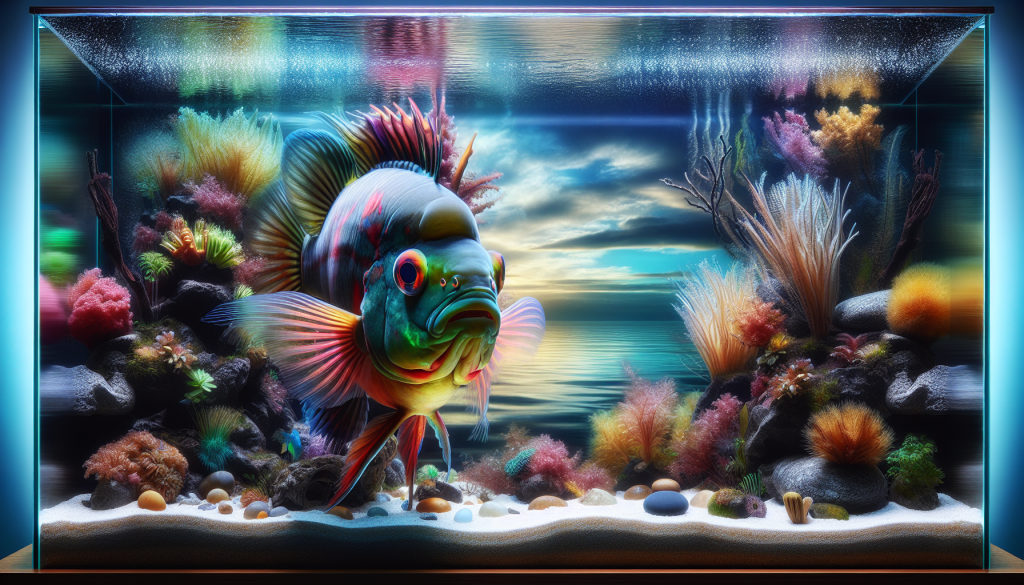Imagine a serene and colorful underwater world, complete with vibrant coral reefs, gently swaying sea plants, and a collection of fascinating fish species. The age-old question of whether fish are truly content in an aquarium resurfaces, inviting us to ponder their well-being. As fish enthusiasts, it is natural for us to wonder about the happiness of these aquatic creatures in their confined homes. In this article, we will explore the various factors that contribute to the overall happiness of fish in an aquarium, shedding light on this intriguing topic.

The Debate on Fish Happiness in Aquariums
Introduction
When it comes to the topic of fish happiness in aquariums, there is a wide range of opinions and perspectives. Some argue that fish can be content and even thrive in captivity, while others believe that keeping fish in an aquarium deprives them of their natural behaviors and overall well-being. This debate necessitates a closer look at factors that may affect fish happiness, scientific research on the topic, ethical considerations, and potential improvements in aquarium practices.
Defining Fish Happiness
Before diving into the various aspects surrounding fish happiness in aquariums, it is essential to define what we mean by “happiness” in the context of fish. While it may be challenging to accurately assess and communicate fish emotions, signs of well-being such as natural behaviors, good health, and overall vitality can indicate a level of contentment in aquatic environments.
Different Perspectives
The topic of fish happiness in aquariums elicits different viewpoints based on personal beliefs, experiences, and cultural backgrounds. Some individuals view aquariums as an opportunity to appreciate and care for marine life, believing that fish can lead fulfilling lives in well-maintained tanks. However, others argue that keeping fish in captivity restricts their natural instincts and creates an environment that cannot replicate their natural habitat.
Scientific Research
Understanding fish happiness requires a scientific approach that investigates their behaviors, physiological responses, and overall welfare in aquarium settings. Researchers have conducted studies to shed light on this topic, exploring the impact of factors such as aquarium size, water quality, social interaction, and environmental enrichment on fish well-being. By utilizing objective measures and observational techniques, scientists strive to uncover empirical evidence regarding fish happiness in aquariums.
Ethical Considerations
When discussing the happiness of fish in aquariums, ethical considerations must be taken into account. It is necessary to ensure that fish are not subjected to unnecessary suffering or compromised welfare. Questions arise regarding the justification of keeping fish solely for human enjoyment, particularly when there are potential negative consequences on their well-being. Balancing the ethical implications with the desire to have aquariums requires careful thought and decision-making.
Factors Affecting Fish Happiness
Aquarium Size and Design
The size and design of an aquarium play a crucial role in determining the happiness of fish. A larger tank provides more swimming space and allows for the creation of distinct microhabitats within the aquarium. Properly designed tanks can simulate natural environments, incorporating rock formations, plants, and hiding spots that mimic the fish’s native habitats.
Water Quality and Maintenance
Maintaining optimal water quality is vital for the health and happiness of aquarium fish. Factors such as temperature, pH levels, ammonia, and nitrate levels must be carefully monitored and controlled. Regular maintenance, including water changes and filtration system upkeep, helps ensure a clean and safe environment for the fish.
Compatibility and Social Interaction
Fish, like many other animals, are social creatures and often thrive in the company of their own kind. Choosing compatible fish species that can peacefully coexist and engage in natural social behaviors can positively impact their happiness. Providing appropriate group sizes, taking into account hierarchy and aggression levels, fosters harmonious social interaction among the fish.
Enrichment and Stimuli
To enhance fish happiness in aquariums, it is essential to provide them with enrichment and stimuli that mimic their natural environment. This can include the addition of live plants, hiding places, and objects for exploration. Varying the tank’s layout and offering different types of food and feeding methods can also provide mental stimulation and prevent boredom.
Feeding and Nutrition
Proper nutrition plays a significant role in maintaining fish happiness. A balanced and species-appropriate diet helps ensure optimal growth, vibrant colors, and overall well-being. Providing a variety of high-quality food options that address the nutritional needs of the fish helps mimic their natural foraging behaviors and contributes to their happiness.
Positive Aspects of Aquarium Life
Protection from Predators
One of the significant advantages of aquarium life for fish is the protection it offers from natural predators found in the wild. In an aquarium, fish are shielded from potential threats, reducing stress and fear associated with predation.
Consistent Food Supply
In the right environment, aquarium fish enjoy a reliable and consistent food supply. Unlike in the wild, where food availability can vary, fish in aquariums are fed on a regular schedule, ensuring they receive the necessary nutrition.
Health Monitoring and Veterinary Care
Aquarium fish often benefit from regular health monitoring and access to veterinary care. Through routine check-ups and preventive measures, potential health issues can be identified and addressed promptly, leading to better overall fish welfare.
Reduced Stress from Environmental Changes
Aquarium fish experience less stress associated with sudden changes in their environment, such as temperature fluctuations or water conditions. Maintaining stable and controlled conditions in an aquarium helps alleviate stress and promotes fish well-being.
Educational and Therapeutic Value
Aquariums have educational and therapeutic value, allowing people to observe and learn about marine life firsthand. They can serve as conservation tools, raising awareness about the importance of protecting natural habitats and promoting respect for all forms of aquatic life.
Negative Aspects of Aquarium Life
Limited Living Space
Despite efforts to recreate natural environments, living in an aquarium inevitably restricts the space fish have available for swimming and exploring. This limitation can impact their ability to exhibit natural behaviors, potentially leading to unhappiness and reduced quality of life.
Artificial Environment
Aquariums provide artificial environments that may lack the complexity and diversity of the fish’s natural habitat. Although attempts are made to replicate natural settings, the confined space and limited resources can never fully substitute for the vastness of the ocean or other bodies of water.
Lack of Natural Behaviors
Fish in aquariums may face limitations in expressing their natural behaviors. Swimming patterns, territorial defense, and mating rituals may be altered or entirely absent in captivity, leading to frustration and reduced stimulation for the fish.
Social Isolation and Stress
While some fish species can thrive in solitary environments, many others require social interaction for their well-being. Limited access to companionship and lack of social hierarchy dynamics can result in social isolation and stress.
Risk of Disease and Poor Welfare
Fish kept in aquariums are susceptible to various diseases due to close confinement, potential water quality issues, and stress. Ensuring optimal husbandry practices, regular health checks, and appropriate quarantine measures are essential to minimize the risk of disease and maintain high standards of fish welfare.

Understanding Fish Behavior and Emotions
Fish Sensory Abilities
Fish possess a range of sensory abilities that allow them to perceive and respond to their surroundings. They can detect changes in water temperature, pressure, vibrations, and chemical cues. Understanding these sensory abilities is integral to comprehending their behaviors and assessing their potential emotional states.
Complex Social Structures
Many fish species exhibit complex social structures and engage in intricate communication with their conspecifics. They form social hierarchies, display courtship behaviors, and engage in cooperative tasks. The study of these behaviors provides insights into the emotional lives of fish.
Possibility of Emotional States
While it is challenging to definitively prove whether fish experience emotions, the existence of brain structures and neurotransmitters associated with emotions in fish suggests the possibility. Observing behavioral responses and physiological changes under different conditions can provide clues to their emotional well-being.
Challenges in Measuring Fish Emotions
Measuring fish emotions presents significant challenges due to their fundamentally different biological makeup compared to mammals. Developing reliable indicators and standardized methodologies to assess emotional states in fish requires further research and scientific advancements.
Debate on Sentience
The issue of fish sentience, the ability to perceive and experience subjective states, continues to fuel debates among scientists, ethicists, and advocates. Some argue that fish possess the capacity for consciousness and emotional experiences, while others maintain skepticism. This ongoing discussion underscores the need for continued research and exploration in the field.
Case Studies: Fish in Captivity
Breeding Programs and Conservation Efforts
Aquariums play a crucial role in breeding programs and conservation efforts aimed at preserving endangered fish species. These programs not only contribute to the genetic diversity of a species but also provide valuable insights into their reproductive biology and behavior.
Public Aquariums and Displays
Public aquariums serve as educational and recreational platforms, allowing people to observe a diverse range of marine life. By showcasing rare and exotic species, these displays encourage empathy and appreciation for fish and their natural habitats.
Home Aquariums and Pet Fish
Home aquariums are a popular choice for fish enthusiasts who enjoy caring for and observing fish firsthand. Responsible and informed pet owners can provide safe and enriching environments, promoting fish happiness through meticulous care and attention.
Comparison with Wild Fish Behavior
Studying fish behavior in aquariums and comparing it to their wild counterparts aids in better understanding the impact of captivity on their well-being. This analysis allows for identifying specific challenges and potential areas of improvement in aquarium husbandry practices.
Effects of Aquaculture Practices
Aquaculture, the practice of farming fish for consumption, is a significant industry worldwide. Evaluating the impacts of aquaculture practices on fish welfare provides insights into how different techniques and systems can influence their happiness and overall quality of life.
Aquarium Industry and Regulations
Commercial Interests and Market Demand
The aquarium industry is driven by commercial interests and market demand for pet fish and aquarium-related products. Balancing consumer preferences with fish welfare considerations requires transparency, education, and responsible marketing practices.
Legislation and Animal Welfare Standards
Various countries have established legislation and animal welfare standards to protect captive fish. These regulations aim to ensure that fish are kept in suitable conditions, with adequate care, nutrition, and environmental enrichment.
Best Practices and Guidelines
Responsible aquarium management relies on best practices and guidelines developed by experts in the field. These guidelines address critical factors such as tank size, water quality parameters, species compatibility, and ethical considerations, aiming to promote fish happiness and well-being.
Advancements in Husbandry Techniques
Continuous advancements in aquarium husbandry techniques contribute to improving fish welfare. Innovations in filtration systems, water quality monitoring, and dietary formulations help recreate natural environments more effectively and enhance the overall happiness of aquarium fish.
Role of Aquariums in Conservation
Aquariums have the potential to play a significant role in conservation efforts by raising awareness and funding research and field projects. Through collaborative initiatives with scientists, conservation organizations, and the public, aquariums can contribute to preserving fish species and their natural habitats.
Improving Fish Welfare in Aquariums
Educating Aquarium Keepers
Education is crucial in promoting responsible fishkeeping practices. Providing aquarium keepers with accurate and up-to-date information on fish species, care requirements, and ethical considerations empowers them to make informed decisions and provide better care for their aquatic companions.
Proper Aquarium Setup and Maintenance
To enhance fish happiness, proper aquarium setup and maintenance are paramount. This includes ensuring suitable tank size, appropriate filtration systems, regular water testing, and adhering to recommended feeding and cleaning schedules.
Promoting Natural Environments
Efforts should be made to create aquarium environments that closely resemble the fish’s natural habitat. This can be achieved through the use of live plants, species-appropriate tank mates, and thoughtful arrangement of rocks, substrate, and aquatic decor.
Enhancing Social Interaction
Creating opportunities for social interaction among fish is vital to their welfare. Providing suitable tank mates and appropriate group sizes, while considering behavioral compatibility, can encourage socialization and natural behaviors.
Research and Ethical Considerations
Continued scientific research on fish behavior, cognition, and welfare is necessary for gaining a deeper understanding of their happiness in aquariums. Ethical considerations, such as avoiding unnecessary confinement and minimizing stress, should guide research practices to prioritize fish well-being.
Ethical Dilemmas and Personal Responsibility
Balancing Human Enjoyment and Fish Welfare
Finding a balance between human enjoyment of aquariums and fish welfare is a complex ethical dilemma. Striving to create enriching environments that prioritize the needs and happiness of the fish ensures that their welfare is not compromised for purely human gratification.
Responsible Fishkeeping
Personal responsibility plays a crucial role in ensuring fish welfare in aquariums. Being knowledgeable about fish species, their requirements, and maintaining proper husbandry practices are key to responsible fishkeeping. Avoiding impulse purchases and supporting ethical businesses also contribute to promoting better fish welfare.
Alternatives to Traditional Aquariums
As the debate on fish happiness in aquariums continues, exploring alternative options for appreciating and learning about fish may offer viable alternatives. Public aquaria, virtual reality experiences, and visits to natural bodies of water provide opportunities for observation without restricting fish to confined spaces.
Public Perception and Consumer Choices
Public perception and consumer choices influence the aquarium industry and the welfare of fish within it. Educating the public about the complexities of fish welfare and encouraging informed decision-making can drive positive changes and improvements in the industry.
Future Outlook and Areas for Improvement
The future outlook for fish happiness in aquariums relies on ongoing research, education, and advancements in aquarium husbandry practices. Heightened awareness of ethical considerations, stronger regulations, and a focus on fish welfare will contribute to enhancing the lives of aquarium fish and addressing concerns surrounding their happiness.
Conclusion
Considering the debate on fish happiness in aquariums requires a comprehensive evaluation of several factors affecting their well-being. While the topic may elicit differing opinions, scientific research, ethical considerations, and an understanding of the intricacies of fish behavior contribute to an informed discussion. By carefully considering the factors discussed, promoting responsible fishkeeping practices, and continuing research and awareness, we can aim for improved fish welfare and happiness in aquariums. Ultimately, striking a balance between human enjoyment and fish well-being is key in ensuring a positive and fulfilling life for aquarium fish.

My name is James Gheen, and I am thrilled to welcome you to Tropical Fish Farmers, the ultimate destination for everything related to tropical fish breeding. As an avid underwater enthusiast, I am dedicated to sharing my knowledge and experience to help you successfully breed and care for tropical fish. Whether you’re a beginner starting your aquarium journey or a seasoned breeder looking to expand your knowledge, my website has something for everyone. Dive into our extensive library of articles, tutorials, and videos covering various topics to enhance your breeding success. Join me in our vibrant community and let’s contribute to responsible fish breeding and conservation efforts together. Discover Tropical Fish Farmers and become part of our global community today.

